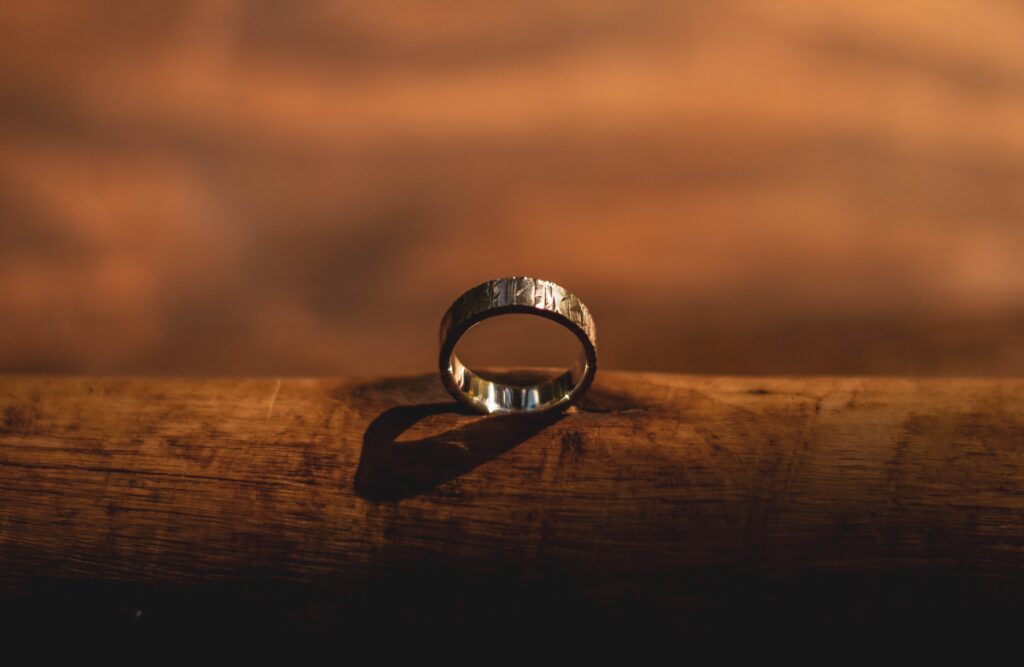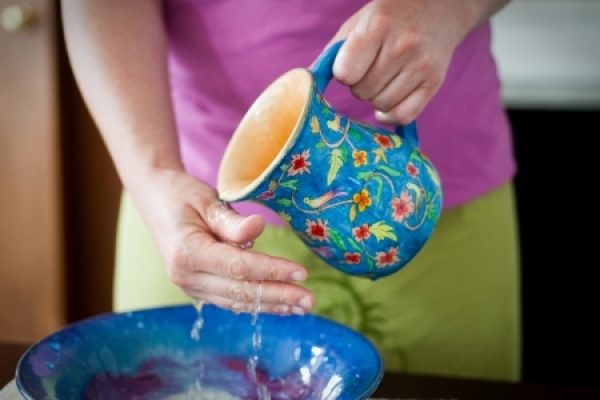Background
A widow’s emotional process of removing her wedding ring is a significant milestone in the journey of grief. A ritual which draws on traditional liturgy could ease the pain of this process. The ritual would be done in a comfortable private space, such as the widow’s home with a few very close friends by her side. The ritual would be led by a rabbi, spiritual leader or close friend chosen by the widow. This person should be able to hold the space and allow the focus to be on the widow and what she is going through. The ritual can be adjusted to meet the individual needs of the widow.
NOTE – All blanks are to be filled in with the name of the widow.
(Begin with a niggun, for example Debbie Friedman’s havdalah melody which marks a time of transition.)
Officiant:
“We gather here to support ___________ in her time of letting go. We recognize that life is precious and how much ____________ has been through. We recognize her great loss and her great bravery in reaching this point.”
“We gather here to support ___________ in her time of letting go. We recognize that life is precious and how much ____________ has been through. We recognize her great loss and her great bravery in reaching this point.”
Officiant to Widow:
“____________, is there anything that you would like to share as you begin this process of transition today.” [Widow shares]
“____________, is there anything that you would like to share as you begin this process of transition today.” [Widow shares]
Officiant to Widow’s Friends (or friends and family):
“I now invite ____________’s friends to share what strengths they see in ____________ that will help her to take this step into the next chapter of her life.” [Friends share]
“I now invite ____________’s friends to share what strengths they see in ____________ that will help her to take this step into the next chapter of her life.” [Friends share]
Officiant to Widow:
“___________, what do you see in yourself that will help you on the road ahead? And is there something you would like to share that you learned from your late spouse, which will help you in this next chapter of life?” [Widow shares]
“___________, what do you see in yourself that will help you on the road ahead? And is there something you would like to share that you learned from your late spouse, which will help you in this next chapter of life?” [Widow shares]
All sing Kol Ha’Olam Kulo:
Kol ha-olam kulo gesher tzar m’od,
Gesher tzar m’od, gesher tzar m’od.
V’ha-ikar, v’ha-ikar –
Lo l’fakhed klal, lo l’fakhad.
Gesher tzar m’od, gesher tzar m’od.
V’ha-ikar, v’ha-ikar –
Lo l’fakhed klal, lo l’fakhad.
כָּל הָעוֹלָם כֻּלּוֹ גֶּשֶׁר צַר מְאֹד
גֶּשֶׁר צַר מְאֹד גֶּשֶׁר צַר מְאֹד
וְהָעִקָּר וְהָעִקָּר
לֹא לְפַחֵד כְּלָל לֹא לְפַחֵד
The whole world is a narrow bridge, and the important thing is not to be afraid.
—Rabbi Nachman of Bratzlav
Friends to Widow:
“We stand here together to support you. You have no need to fear. We are with you today and we will be with you on the journey ahead.”
“We stand here together to support you. You have no need to fear. We are with you today and we will be with you on the journey ahead.”
Interpretive Psalm 281
NOTE – The verses of the psalm are in italics and are read by the widow one line at a time. After each verse the officiant reads the words of comfort to the widow.
NOTE – The verses of the psalm are in italics and are read by the widow one line at a time. After each verse the officiant reads the words of comfort to the widow.
Widow:
“I cry out to You G-d, my Rock, do not be silent with me, lest if you are silent to me, I become like those gone down into the pit of despair.” (verse 1)
“I cry out to You G-d, my Rock, do not be silent with me, lest if you are silent to me, I become like those gone down into the pit of despair.” (verse 1)
Officiant:
“G-d please be with ___________ in her journey of grief and healing. Please accompany her in this time of sacred transition and allow us to support __________ on her way. Help her to know that she need not remain in her time of despair.”
“G-d please be with ___________ in her journey of grief and healing. Please accompany her in this time of sacred transition and allow us to support __________ on her way. Help her to know that she need not remain in her time of despair.”
Widow:
“Hear the voice of my supplications, when I cry out to You, when I lift my hands toward Your inner sanctuary.” (verse 2)
“Hear the voice of my supplications, when I cry out to You, when I lift my hands toward Your inner sanctuary.” (verse 2)
Officiant:
“Shekhinah, open your heart to ____________, and allow her in. Bless her hands as she prepares for this symbolic transition.”
“Shekhinah, open your heart to ____________, and allow her in. Bless her hands as she prepares for this symbolic transition.”
Widow:
“Do not let me be dragged down by guilt, regret and sorrow, speaking peacefully, but still with sadness in my heart.” (verse 3)
“Do not let me be dragged down by guilt, regret and sorrow, speaking peacefully, but still with sadness in my heart.” (verse 3)
Officiant:
“Please open up ___________’s heart, allow her to release her feelings of regret, guilt and fear that bind her to the past. Help her know that her love for her late spouse will always be there, yet she can now allow new life to flow into her heart.”
“Please open up ___________’s heart, allow her to release her feelings of regret, guilt and fear that bind her to the past. Help her know that her love for her late spouse will always be there, yet she can now allow new life to flow into her heart.”
Widow:
“Allow my sorrows to be returned to You, for I know that succumbing to my sorrows will only bring more despair unto the works of my hands.” (verse 4)
“Allow my sorrows to be returned to You, for I know that succumbing to my sorrows will only bring more despair unto the works of my hands.” (verse 4)
Officiant:
“G-d accept __________’s grief as a gift into your hands. It is time for You to carry this burden now. While feelings of grief can visit us throughout our lives, please honor all the grieving __________ has done thus far. We, as representatives of her community, acknowledge her strength and courage in facing her pain. Help her to step forward and to refocus the deeds of her hands on her own creativity and of building her life anew.”
“G-d accept __________’s grief as a gift into your hands. It is time for You to carry this burden now. While feelings of grief can visit us throughout our lives, please honor all the grieving __________ has done thus far. We, as representatives of her community, acknowledge her strength and courage in facing her pain. Help her to step forward and to refocus the deeds of her hands on her own creativity and of building her life anew.”
Widow:
“Anger keeps me from discerning Your presence, O G-d, let me know the will of Your hands, and not be overthrown by resentment. Rebuild my life (in Your image).” (verse 5)
“Anger keeps me from discerning Your presence, O G-d, let me know the will of Your hands, and not be overthrown by resentment. Rebuild my life (in Your image).” (verse 5)
Officiant:
“G-d I know You are filled with chesed and rachamim, with love and compassion, as you have been by __________’s side through her journey of grief, a journey that includes a wellspring of emotions from despair to anger because her spouse is no longer by her side. Please know that ___________ is ready to begin to release these emotions to You now. Shekhinah, please accept all of these emotions as a gift into Your hands.”
“G-d I know You are filled with chesed and rachamim, with love and compassion, as you have been by __________’s side through her journey of grief, a journey that includes a wellspring of emotions from despair to anger because her spouse is no longer by her side. Please know that ___________ is ready to begin to release these emotions to You now. Shekhinah, please accept all of these emotions as a gift into Your hands.”
Widow:
“Blessed is G-d for G-d hears the voice of my supplications. G-d is my strength and my shield, my heart trusts in G-d, and I have been helped, my heart exults, and with song I thank G-d.” (verses 6-7)Officiant:
“You are a woman of great strength. Do not be afraid to let G-d, me and your friends support you in the months and years ahead. You may now remove your wedding ring.”
“Blessed is G-d for G-d hears the voice of my supplications. G-d is my strength and my shield, my heart trusts in G-d, and I have been helped, my heart exults, and with song I thank G-d.” (verses 6-7)Officiant:
“You are a woman of great strength. Do not be afraid to let G-d, me and your friends support you in the months and years ahead. You may now remove your wedding ring.”
___________ removes her ring and places it in a beautiful box which her friends have handed, one to another, down the line until the friend closest to __________ opens it up for the ring to be placed inside. This is done while the officiant sings a niggun (again the melody of Debbie Friedman’s Havdalah blessings – since it marks a time of transition.)
Widow:
“G-d is my strength, a place of safety and protection, who helps me to rededicate my life.” (verse 8)
“G-d is my strength, a place of safety and protection, who helps me to rededicate my life.” (verse 8)
All in Unison:
“Deliver and bless [us], Your own people; tend to us and sustain us forever.” (verse 9)
“Deliver and bless [us], Your own people; tend to us and sustain us forever.” (verse 9)
In silence all walk to the sink. ______________ washes her hands with soap and water from the tap.
Then each friend fills the ritual washing cup with a little water. _____________ says the traditional blessing for hand washing (can be adapted to use female G-d language):
Then each friend fills the ritual washing cup with a little water. _____________ says the traditional blessing for hand washing (can be adapted to use female G-d language):
בָּרוּךְ אַתָּה ה’ אֱלֹהֵינוּ מֶלֶךְ הָעוֹלָם אֲשֶׁר קִדְּשָׁנוּ בְּמִצְוֹתָיו וְצִוָּנוּ עַל נְטִילַת יָדַיִם
Barukh Atah Adonay, Eloheynu, Melekh ha’olam, asher kidshanu b’mitzvotav, v’tzivanu al n’tilat yadayim.
Blessed are You, Adonai, our G-d, Sovereign of the Universe, who makes us holy with Your commandments, and commands us in the washing of the hands.Conclusion
Officiant:
“____________, please put your hands on your heart as a reminder that, despite the enormity of your loss, love is still real and present in your life.”
Officiant:
“____________, please put your hands on your heart as a reminder that, despite the enormity of your loss, love is still real and present in your life.”
Friends Sing [To the tune of the Ahavah Rabbah chant (with great love)]:
“Ahavah Rabbah, We love you.” x2
Close with hugs and ____________ may choose to say a few words.
1-I have adapted Psalm 28 so that it focuses on the journey of grief and the process of rededicating one’s life after loss. I significantly adapted verses 3-5 because they focus on evildoers that the psalmist is struggling with; I reworked these lines to focus on the widow’s struggles in a way that would better meet her needs.Despite my translation choice, I in no way mean to imply that grief and despair is evil, rather it is a healthy part of the healing process. Whenever possible I drew from the resonances of the Hebrew words. For instance, in verse 3, רשעים means “one guilty of crime,” so this is clearly not relevant for a widow, but feelings of guilt and regret may burden her. In addition, אוןcan also mean trouble or sorrow, which is a central part of grief. Similarly, while רעהmeans evil, לב-רעmeans sad. When I was not able to keep the resonances of the biblical Hebrew, I retained the themes as much as possible such as intense emotions, use of hands, building, and rededicating. The translation for the other lines of the psalm draws on the translation choices of JPS (1917), Young’s literal translation, the NIV and TNK translations, as well as some entries from the Brown-Driver-Briggs Hebrew and English Lexicon.













